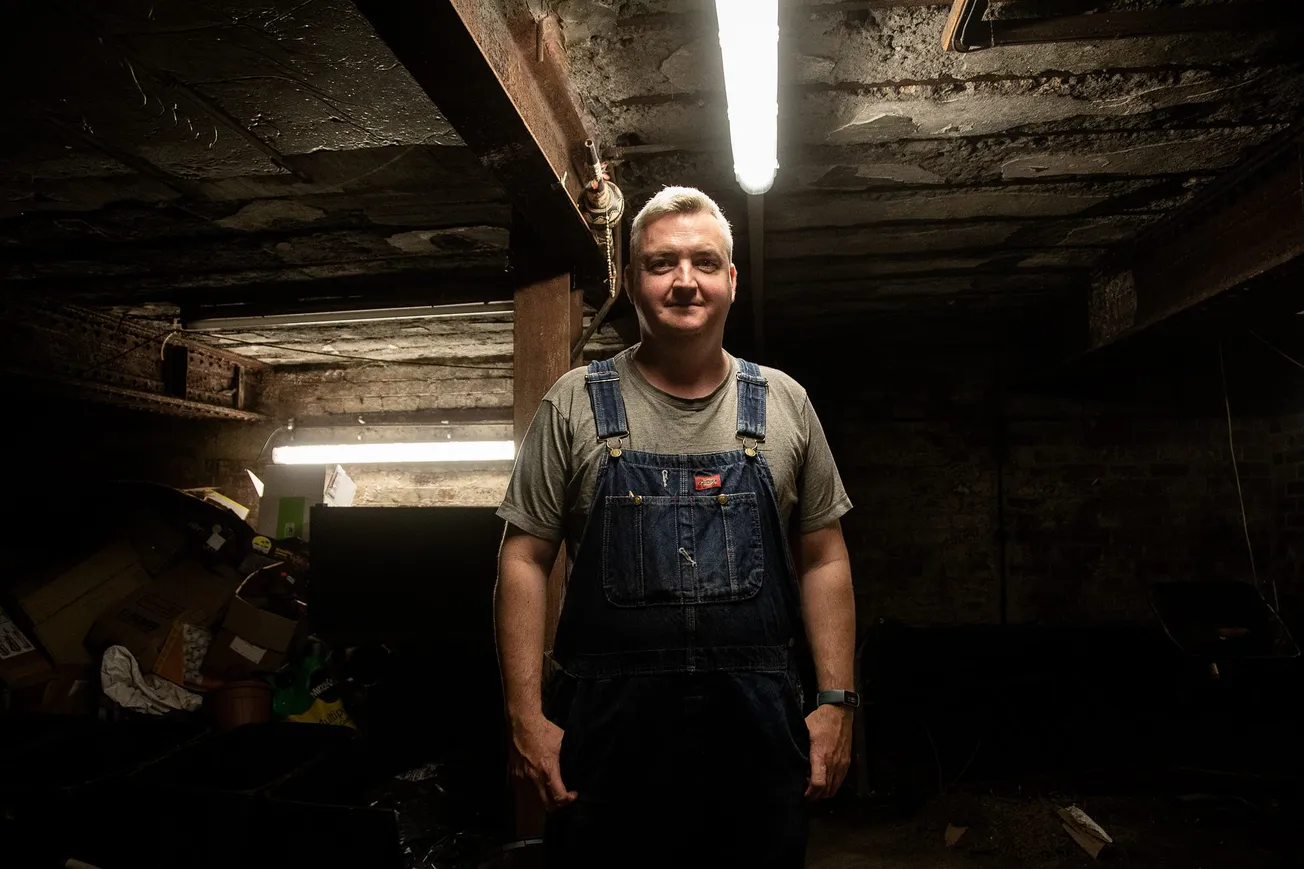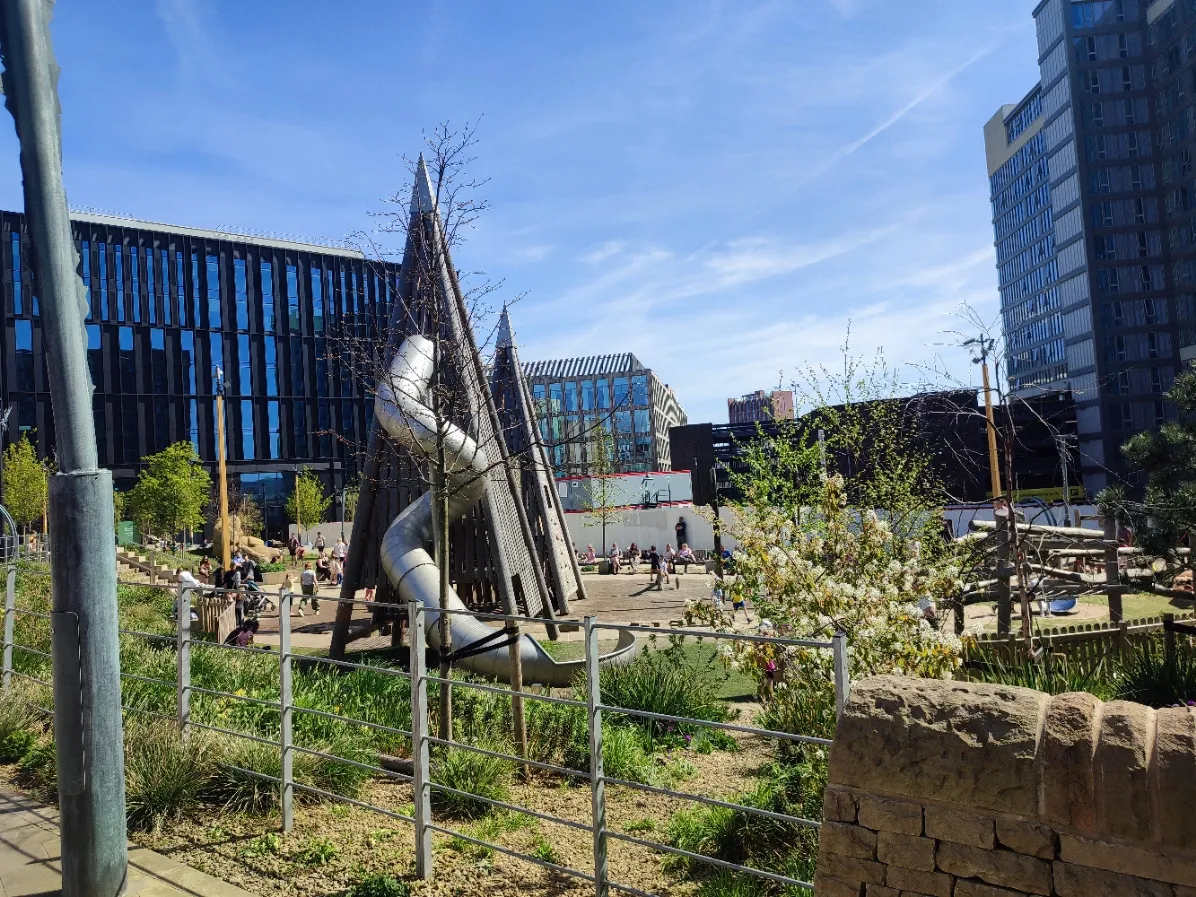Good afternoon members — and welcome to Thursday’s Tribune.
As we discovered in our recent piece about organic growing, Sheffield is bursting with innovation in food production. But growing doesn't have to be limited to the surface world. Leaf + Shoot in Neepsend is an underground farm which provides produce for local restaurants and uses their food waste and thousands of worms to create a fully plant-based growing system. I went down with The Tribune’s photographer Dani Cole on Wednesday to discover what exactly owner Luke Ellis is doing in the dark under the Peddler Warehouse.
Mini-briefing
🥦 A food waste recycling trial is to begin in Sheffield at the end of August. 8,200 houses across the city will take part in the trial which will involve their food waste being collected separately and taken to anaerobic digestion facilities. The council says it believes a third of the contents of black bins could be recycled in this way. Green councillor Paul Turpin revealed on Twitter yesterday that two of the areas chosen for the trial are Gleadless Valley and Meersbrook.
🏗️ The Yorkshire Post report that work has started on a major new development in West Bar which could create up to 8,000 jobs. When completed in 2024, the first phase of the £300m scheme will include No. 1 West Bar Square, a 100,000 square foot office building with retail space on the ground floor and a roof terrace offering panoramic views; and Soho Yard, a £78 million development of 368 build-to-rent apartments owned and operated by Legal & General.
🔥 The Star reports the shocking news that the council is looking at ways the city can support “warm banks” to help people this winter as the cost of living crisis bites. The plan would include opening up heated community buildings so that people can come in during the day, rather than have to heat their own homes. Councillor Mazher Iqbal said predictions that the energy bill price cap could rise to £3,850 this October meant “something has to be done”.
Things to do
🌯 It’s the first weekend of the month so that must mean Peddler Market is returning to the Burton Road warehouse in Neepsend. Traders this weekend include Neapolitan-style pizza specialists B’Reyt Dough, Hungarian street food stall Hun Street Kitchen and Middle Eastern mezze and kebabs from MorMor. As well as the street food, there’s also craft beer, cocktails, art stalls and live music. For a full list of all the traders on Friday and Saturday, click here.
🎭 Join Sheffield's first ever poet laureate Otis Mensah as he curates a free evening of poetry and sound in the Samuel Worth Chapel at Sheffield General Cemetery. Named after Otis’ poem about Samuel Morgan Smith, an African-American Shakespearean actor who settled in Sheffield in the late 19th century, Blue Fire celebrates the beauty, rich influence and presence of the Black diaspora in poetry and sound across Europe, past and present.
🎨 Paint Jam Weekender is the third of four Out & About events taking place this summer at the new Pinball Park in Sheffield's Cultural Industries Quarter. Across Saturday August, 6 and Sunday, August 7, the Paint Jam will showcase a range of family-friendly activities all focused on live art and creativity. Watch talented artists at work, head out on a street art tour or join in some hip-hop dancing. For the full weekend line-up, see this page on Our Favourite Places.
Behind an unassuming Neepsend warehouse lies a portal to another world. A flight of stairs ushers you into a labyrinthine basement. Inside, Luke Ellis and a small army of worms are busy making the food of the future.
Luke greets me in a pair of Dickies dungarees and a grey t-shirt. His subterranean office is unconventional, to say the least. Atmospheric lighting gives the space an unnatural orange glow while an overwhelming smell of damp fills the air. We’re only a few metres below the sunny surface, but down here it’s cool. During the recent heatwave Luke says the temperature never breached 11℃.
Before starting his underground farm, named Leaf + Shoot, the 43-year-old ran his own building firm in Birmingham for 20 years. But growing things has always been a hobby and eventually he started experimenting with hydroponics (growing plants in water without soil) and aquaponics (growing plants using the ammonia produced by fish). He first moved to Sheffield after his street food trader wife took a stall at the monthly Peddler Market. When they discovered the warehouse’s basement, they asked the owner if they could take over the lease.

He’s happy to see me but is understandably wary of reporters. In the 18 months he’s been running the farm he’s been interviewed by several journalists. While he’s always glad of the publicity, he tells me the pieces that have come out of these conversations have resulted in stories of “varying degrees of accuracy”. I promise I’ll try to do better.
The other journalists who have spoken to him have all been amazed that you can grow food in a dark, damp environment like this. Suspending plants in water or stacking them up on top of each other still feels like science fiction to most people. But hydroponics has been done since the 1920s and is now a multi-billion dollar industry while vertical farming is increasingly fashionable among amateur gardeners who want to grow “microgreens” as a side hustle. This obsession with hydroponics and vertical farming has led to some misunderstandings. “Everyone thinks I’m growing weed down here,” he tells me.
The key difference in terms of what Leaf + Shoot is doing is what powers the system. Hydroponic farms usually use fertilisers made from animal products like fish, blood or bone meal and synthetic nutrients that have been made artificially in a factory. But what Luke has developed is what he calls a “closed loop” which is entirely plant-based and organic. This involves making his own soil from food waste, paper, cardboard, woodchip and coffee grounds. He then uses his worms to transform these raw materials into a fine, nutrient-dense soil. Once the produce is harvested, the soil returns to the worms to be processed again.

“Everything that a plant needs is already contained within that plant,” he tells me. “So by putting everything back into the system and not flushing anything away, we make all the nutrients the plants need in this basement.” This idea is similar to the permaculture approach adopted by organic growers on the surface, but no one has ever tried it indoors before. Luke tells me his ultimate goal is to become the first certified organic indoor farmer in the UK.
On a quick tour of the basement he starts to explain in more detail — and I start to empathise with the previous reporters. It’s an incredibly complicated process and even then I know he’s not explaining the half of it. There’s also lots he can’t tell me including the meaning of the fiendishly complex diagram on a whiteboard in his office. Working with scientists from the University of Sheffield has opened up lots of opportunities but has also meant he’s had to sign an agreement not to disclose information that could be “commercially sensitive” .
Thankfully, the plants are slightly easier to understand. In one room, tray after tray of green shoots sit under bright LED lights, while tanks of water connected by plastic pipes bubble away underneath. In the growing trays are an astonishing array of tiny green crops. These include red radish, broccoli, coriander, shiso, basil, micro kale and many others I can’t remember. Grabbing a pair of scissors, Luke cuts off samples for me to try and watches my reaction as the intense flavours explode on my tongue. “When you grow stuff like this it makes it taste a lot stronger,” he reveals.

Next door, polystyrene trays float on tanks of water ready for 140 lettuces to be planted into, while in a back room half a dozen bathtubs are filled with tonnes of soil and hundreds of unseen “red wiggler” worms, especially chosen for their tendency to munch through soil at an astonishing rate. The system works just like a forest, he tells me. But the “closed loop” he’s created supercharges the process. In just eight weeks time they will produce a soil that is perfect to be planted into, something that in the natural world would take years. Despite my baffled expressions he says it’s actually quite a simple process of trays, buckets, pumps and hoses. The clever bit is the natural processes happening in the soil and the worms. “The really complicated stuff going on is the microbiology,” he tells me.
Wandering around the various rooms, it becomes difficult to know what’s product and by-product. Everything Luke produces in his subterranean garden is useful, from the food he sells to local businesses to the soil produced by his worm farms and the liquid plant food that collects in buckets under them (as well as being fed back into the system, Luke sells the soil and liquid plant food as a environmentally friendly alternative to Miracle-Gro).

Why does he have to do this, I ask. Why not just grow in polytunnels on the surface using natural light and saving on electricity? Luke explains. First of all, proving that it can be done in this way means you don't have to use fertiliser or pesticides to farm indoors, which are unsustainable as a form of agriculture. Secondly, it also futureproofs farming against a time when humans might find it increasingly difficult to grow outdoors. Lots of crops were destroyed in the recent heatwave and climate change is likely to mean we get even more weather that is too hot, windy or rainy to grow in. And thirdly, by growing in places like basements, you free up land on the surface for rewilding, aiding biodiversity and the fight against climate change.
When it’s properly up and running, Luke says his small basement could make as much food as a three-acre farm. He currently sells to local businesses including nearby plant-based restaurant VorV who in turn provide him with food waste from the restaurant. But in theory every restaurant could have an underground farm which uses their rubbish to create more produce. He hopes he’s just the first. “No one has ever done this anywhere else in the world,” he tells me. And maybe one day it could even spread beyond that. He believes that the system he’s developed could not only help feed our planet but also aid humanity’s journey to other parts of the solar system. “One day there’ll be some guy like me in dungarees on Mars doing this.”
To find out more about Leaf + Shoot, follow them on Instagram or Facebook.


Comments
How to comment:
If you are already a member,
click here to sign in
and leave a comment.
If you aren't a member,
sign up here
to be able to leave a comment.
To add your photo, click here to create a profile on Gravatar.







